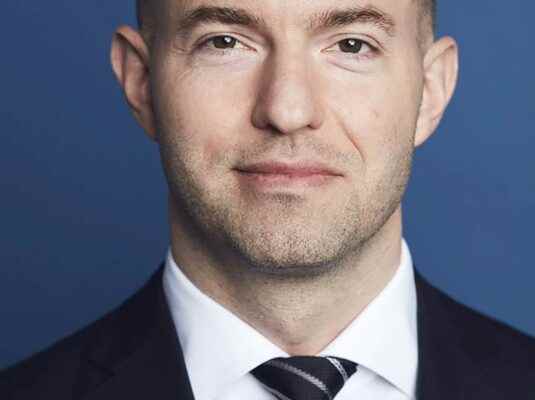The former CEO of the German company Wirecard, Markus Braun, at the opening of his trial, on December 8, 2022 in Munich (AFP / CHRISTOF STACHE)
The trial of the former CEO of the German company Wirecard opened on Thursday in Munich, two and a half years after the resounding bankruptcy of this payment provider which splashed the financial and political world.
All eyes are on Markus Braun, who was at the helm of this flagship of the digital sector, having deceived people until its crash in June 2020.
This 53-year-old Austrian, in pre-trial detention since the start of the investigation, will he lift the veil on the workings of the embezzlement of which he is accused?
He denies any crime and considers himself rather a victim of fraud but has never expressed himself in detail on the facts. Dressed in a blazer and a turtleneck, he began Thursday to answer judges’ questions about identity, AFP journalists noted.
The river trial started in a secure room within the Stadelheim prison, in the Bavarian capital, and will continue at least until 2024.
– Billionaire boss –
During the years of Wirecard’s meteoric rise, Markus Braun, a computer engineer by training, cultivated resemblances to former Apple boss Steve Jobs, like him wearing dark turtlenecks and laying out his vision for a future digital.

Journalists wait outside the entrance to the courtroom of the Munich court ahead of the opening of the trial of former Wirecard CEO Markus Braun on December 8, 2022 (AFP/CHRISTOF STACHE)
But the Munich public prosecutor’s office sees him as a simple crook acting as a gang leader, holding him mainly responsible for an “unprecedented” scandal in post-war Germany, according to then-Finance Minister Olaf Scholz, who has since become chancellor.
Mr. Braun is accused of accounting fraud, market manipulation, particularly serious breach of trust and organized fraud.
Two former executives will also be in the box of the accused: Stephan von Erffa, former chief accountant, and Oliver Bellenhaus, former director of a Dubai-based subsidiary, who will serve as a “key witness” for the prosecution.

The CEO of the German company Wirecard, Markus Braun, on September 18, 2018 at the company’s headquarters in Aschheim, near Munich (AFP/Archives/Christof STACHE)
Taking the lead in 2002 of a young start-up that made money from porn and gambling sites, Mr. Braun raised Wirecard to the elite of the German Stock Exchange, the Dax index, in 2018.
The firm of Aschheim, in the south of Germany, was then worth more than the behemoth Deutsche Bank and Mr. Braun, who held 7% of the shares, was a billionaire.
– Fictitious sales –
Wirecard went public in June 2020, after its executives admitted that 1.9 billion euros in assets, a quarter of the size of the balance sheet, did not actually exist.
Central actor in the alleged fraud, the Austrian Jan Marsalek, former right-hand man of Mr. Braun, has been on the run for two and a half years.
The case pours with him into the spy novel because Mr. Marsalek, 42, is suspected of having benefited from complicity within certain secret services and of being linked to Russian or Libyan interests.
The investigation revealed that Wirecard’s accounts for the years 2015 to 2018 had embellished the situation, in order to make the company attractive to investors.

Photo provided by police of Austrian businessman Jan Marsalek in 2019 (Police Munich/AFP/Archives/Handout)
Part of the payment-based commissions did not come from Wirecard but from purported third parties in Asia and the Gulf region, which had a license to operate.
However, “there was in fact no reseller connected by these partners” and therefore no tangible turnover, according to the indictment.
Wirecard was, however, able to finance itself for years, to make up for its real losses.
– Curried policies –
The shareholders lost in the bankruptcy more than 20 billion euros and the creditor banks 2 billion euros.
The case revealed the shortcomings of the German financial market supervisor (BaFin), placed under the supervision of the Ministry of Finance, and of the accounting audit firm, the multinational EY.

German Chancellor Angela Merkel after a hearing in the Wirecard case, April 23, 2021 in Berlin (AFP/Archives/John MACDOUGALL)
“Politics must ensure that supervision works”, but “there have been shortcomings”, estimates Volker Brühl, professor at the Center for Financial Studies in Frankfurt.
Nobody was ready to “admit that fraudsters were at work at Wirecard”, he explains to AFP.
The political world up to the former Chancellor Angela Merkel, who had gone to China accompanied by the ex-CEO of Wirecard, was also crushed throughout the parliamentary commission of inquiry which did not succeed, however. to point out the responsibility of those who govern.
© 2022 AFP
Did you like this article ? Share it with your friends with the buttons below.




